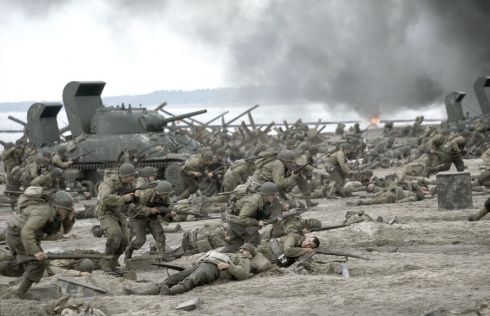In Hollywood mythology, great battles wheel and turn on the actions of individual heroes. In Steven Spielberg's Saving Private Ryan, thousands of terrified and seasick men, most of them n ew to combat, are thrown into the face of withering German fire. The landing on Omaha Beach was not about saving Pvt. Ryan. It was about saving your skin.
ew to combat, are thrown into the face of withering German fire. The landing on Omaha Beach was not about saving Pvt. Ryan. It was about saving your skin.
Four Ryan brothers go to war. Three get killed on D-Day and one is lost behind enemy lines. A commanding squad captain, John Miller (Tom Hanks) is sent to find the remaining brother, Private James Ryan. Like any good modern war film, the hero, John Miller, is a moral, upright leader who puts the safety of his squad first, and wrestles with the suicidal goals of his mission. Eight men risk their lives to save one. The resulting drama, set against the horrifying backdrop of war, is some of the best cinema to come out of Hollywood in years.
The movie's opening sequence is as graphic as any war footage I've ever seen. In fierce dread and energy it's on a par with Oliver Stone's Platoon, and in scope surpasses it--because in the bloody early stages the landing forces and the enemy never meet eye to eye, but are simply faceless masses of men who have been ordered to shoot at one another until one side is destroyed.
It’s impossible to properly describe in words the brutal honesty, the chaotic nature, and the sheer bloodbath and absurd lost of human life that took place on those beaches nearly 60 years ago. The fear of the men, of even the veteran Miller, comes through in quick snippets, all centering on Miller as he struggles through his own fears to lead his men to salvation. It is at once hellish, exciting, and painful to watch. By the time it is over, you feel as if you’ve lived through it all, and not merely watched it.
Then there is the human element. Hanks is a good choice as Capt. Miller, an English teacher who has survived experiences so unspeakable that he wonders if his wife will even recognize him. His hands tremble, he is on the brink of breakdown, but he does his best because that is his duty. All of the actors playing the men under him are effective, partly because Spielberg resists the temptation to make them zany "characters'' in the tradition of World War II movies, and makes them deliberately ordinary. Matt Damon, as Pvt. Ryan, exudes a different energy, because he has not been through the landing at Omaha Beach; as a paratrooper, he landed inland, and although he has seen action he has not gazed into the inferno.
The one thing that can be said about Saving Private Ryan is that it hu rts. Whenever a character is shot, even a peripheral one, the audience feels it. This method of bullet squibs has been used over and over now, including in the HBO TV miniseries “Band of Brothers.” I think it’s safe to say Saving Private Ryan popularized a lot of the “war techniques” you’ve seen lately, and that the consequences of Saving Private Ryan’s brutal portrayal of war will be felt for a long time coming.
rts. Whenever a character is shot, even a peripheral one, the audience feels it. This method of bullet squibs has been used over and over now, including in the HBO TV miniseries “Band of Brothers.” I think it’s safe to say Saving Private Ryan popularized a lot of the “war techniques” you’ve seen lately, and that the consequences of Saving Private Ryan’s brutal portrayal of war will be felt for a long time coming.
Saving Private Ryan is a powerful experience. I'm sure a lot of people will weep during it. Spielberg knows how to make audiences weep better than any director. But weeping is an incomplete response, letting the audience off the hook. This film embodies ideas. After the immediate experience begins to fade, the implications remain and grow.
Where's the sense of risking eight lives for one guy?
Labels: Movie Review

[... ] is another must read source of information on this issue[...]
http://trend-fusion.com/
Anonymous said...
February 15, 2010 at 3:23 AM